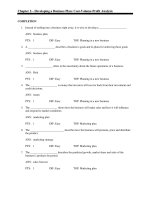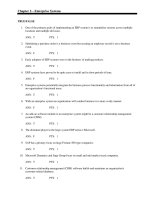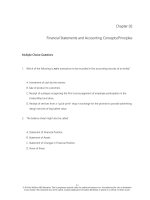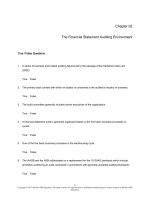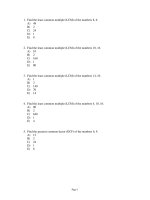Business math 10th edition cleaves test bank
Bạn đang xem bản rút gọn của tài liệu. Xem và tải ngay bản đầy đủ của tài liệu tại đây (115.58 KB, 18 trang )
MULTIPLE CHOICE. Choose the one alternative that best completes the statement or answers the question.
Classify the fraction as proper or improper.
3
1)
5
1)
A) proper
2)
B) improper
47
6
2)
A) improper
3)
B) proper
4
4
3)
A) proper
4)
B) improper
1
2
4)
A) proper
5)
B) improper
4
6
5)
A) improper
B) proper
Provide an appropriate response.
6) The top term in a fraction is called the numerator.
A) True
6)
B) False
7) The bottom term in a fraction is the divisor or the number that divides into the numerator.
A) True
B) False
7)
8) The horizontal line that separates the numerator and the denominator is called the dividend.
A) True
B) False
8)
9) A proper fraction has a value greater than 1.
A) True
9)
B) False
10) A fraction with a numerator that is less than the denominator is called an improper fraction.
A) True
B) False
10)
11) An improper fraction has a value equal to or less than 1.
A) True
B) False
11)
12) Before you can add or subtract fractions, they must have the same denominators.
A) True
B) False
12)
1
Write the fraction as a whole or mixed number.
43
13)
21
A) 2
14)
1
21
D) 2
1
7
4
13
B) 6
6
13
C) 6
4
13
D) 7
4
13
15)
2
13
B) 6
C) 5
D) 7
7
7
16)
B) 0
C) 77
D) 7
42
10
A) 4
18)
C) 1
14)
A) 1
17)
1
21
78
13
A) 6
16)
B) 3
82
13
A) 5
15)
1
21
13)
17)
2
5
B) 5
1
5
C) 4
1
5
D) 3
1
5
15
6
A) 2
18)
5
6
B) 3
1
2
C) 2
1
2
D) 1
1
2
Solve the problem.
19) For every 100 shoppers in a bookstore, $613 dollars worth of books are sold. Express the number of
dollars spent per shopper as a whole or mixed number.
13
13
3
A) 5
B) 6
C) 7
D) 6
100
100
10
Provide an appropriate response.
20) To change an improper fraction into a whole or mixed number, you need only divide the
denominator by the numerator.
A) True
B) False
19)
20)
21) When an improper fraction is converted, if there is a remainder, it is a whole number.
A) True
B) False
21)
22) When an improper fraction is converted, if there is a remainder, it is:
A) a whole number.
B) the numerator.
C) a prime number.
D) the denominator.
22)
2
23) To convert mixed numbers to improper fractions you would:
A) multiply the whole number times the denominator of the fraction and add the product to the
original numerator.
B) none of these.
C) multiply the whole number times the numerator of the fraction and add the product to the
original denominator.
D) multiply the whole number times the denominator of the fraction and add the whole
number to the denominator.
23)
24) When converting mixed numbers to improper fractions, the denominator of the improper fraction
will be the same as the
of the fractional part of the mixed number.
24)
A) LCD
C) numerator
B) denominator
D) none of the above
Write the whole or mixed number as an improper fraction.
4
25) 7
9
A)
26) 27
67
9
11
9
C)
68
9
D)
37
9
1
7
26)
A) 4
27) 16
B)
25)
B)
191
7
C)
34
7
D)
190
7
7
10
A)
27)
112
10
B)
177
10
C)
167
10
D)
23
10
Provide an appropriate response.
28) An equivalent number is a converted whole or mixed number that has the same numerical value
as the original fraction.
A) True
B) False
28)
29) In converting mixed numbers to improper fractions, the numerator of the improper fraction will be
the same as the numerator of the fractional part of the mixed number.
A) True
B) False
29)
30) To convert mixed numbers to improper fractions, multiply the whole number times the
denominator of the fraction and add the product to the original denominator.
A) True
B) False
30)
Reduce to lowest terms.
2
31)
8
A)
2
4
31)
B)
1
8
C)
3
1
4
D)
4
1
32)
3
15
A)
33)
32)
1
5
B)
2
10
C)
2
6
D)
1
15
30
40
A)
33)
10
4
B)
3
4
C)
3
10
D)
30
40
Solve the problem.
34) A Fortune 500 company reported profits of approximately $260 million with approximately $440
million in revenues. Compare the profit to revenue by writing as a fraction in lowest terms.
29
22
439
13
A)
B)
C)
D)
49
13
259
22
Find the greatest common divisor (GCD) for the following then simplify the fraction.
16
35)
28
A) GCD = 3;
7
4
B) GCD = 5;
4
7
C) GCD = 4;
7
4
34)
35)
D) GCD = 4;
4
7
Provide an appropriate response.
36) After fractions have been added, subtracted, multiplied, or divided, the fraction in the answer
should be increased to its highest terms.
A) True
B) False
36)
37) If you multiply or divide both parts of a fraction by the same number, the value of the fraction
does not change.
A) True
B) False
37)
38) A fraction is in lowest terms when there is no number that can be divided evenly into the
numerator and denominator.
A) True
B) False
38)
39) The letters GCD stand for Greatest Common Divisor.
A) True
B) False
39)
40) The greatest common divisor can be zero.
A) True
40)
B) False
41) Fractions should never be reduced to their lowest terms.
A) True
B) False
4
41)
42) To reduce a fraction to its lowest terms:
A) multiply the numerator and the denominator by the same number.
B) add the same number to the numerator and the denominator.
C) subtract the same number from the numerator and the denominator.
D) divide the numerator and the denominator by the same number.
42)
43) The largest possible number that will divide equally into 2 or more other numbers is called the:
A) least common denominator.
B) denominator.
C) numerator.
D) greatest common divisor.
43)
Change the fraction to an equivalent fraction with the given denominator.
3
?
44) =
7 14
A)
45)
5
14
B)
6
14
C)
21
14
44)
D)
8
14
2 ?
=
3 9
A)
45)
6
9
B)
9
9
C)
0
9
D)
2
9
Provide an appropriate response.
46) You can rewrite a fraction to higher terms by adding the numerator and the denominator.
A) True
B) False
47) Raising a fraction to higher terms changes the value of the fraction.
A) True
B) False
46)
47)
Perform the indicated operation. Write the sum as a fraction, whole number, or mixed number in lowest terms.
2
1
1
48)
48)
+
+
10 10 10
A)
49)
B)
2
1000
C)
2
5
D)
4
30
4 1
+
5 5
A)
50)
2
10
1
2
49)
B) 1
C)
5
10
D)
5
5
7 1
+
9 9
A)
50)
7
9
B)
9
10
C)
5
7
8
D)
8
9
51)
5 1
+
8 8
A)
4
5
51)
B)
3
4
C)
2
4
D)
2
3
Find the difference. Write the difference in lowest terms.
6 5
52) 2 2
A)
53)
11
2
B)
52)
1
2
C) 15
D)
1
4
6
2
28 28
A)
2
7
53)
B)
1
7
C)
3
7
D)
1
14
Provide an appropriate response.
54) A prime number is any number larger than 1 that is divisible only by itself and 1.
A) True
B) False
54)
55) Which of the following statements is correct?
A) a prime number can be divided only by 1 and itself
B) prime numbers are also known as least common denominators
C) prime numbers are the reciprocals of fractions
D) none of these
56) Which of the following is not a prime number?
A) 19
B) 29
55)
56)
C) 9
D) 41
57) Before fractions may be added or subtracted, they must all have the same:
A) divisor
B) numerator
C) denominator
57)
D) dividend
SHORT ANSWER. Write the word or phrase that best completes each statement or answers the question.
58) When you add or subtract fractions, you must first change the fractions so that they have
the same
.
58)
59) When you add fractions with the same denominator, you add the
and then
59)
60) When you subtract fractions with the same denominator, you simply subtract the
, place the difference over the denominator, and reduce to the lowest terms.
60)
place that number over the denominator and
to the lowest terms.
6
MULTIPLE CHOICE. Choose the one alternative that best completes the statement or answers the question.
Perform the indicated operation. Write the sum as a fraction, whole number, or mixed number in lowest terms.
1 1
61) +
61)
4 8
A)
62)
B)
3
8
C)
1
4
D)
13
32
1 1
+
3 9
A)
63)
1
6
62)
1
6
B)
4
9
C)
13
27
D)
2
9
1
7
+
4 12
A)
64) 5
1
2
B) 2
2
3
D)
5
6
64)
7
8
B) 6
1
4
C) 6
10
8
D) 7
1
4
1
3
+ 14
7
4
A) 22
66) 20
25
28
65)
B) 9
25
28
C) 23
25
28
D) 24
25
28
4
2
5
+ 17 + 14
7
7
7
A) 51
67) 5
C)
7
3
+1
8
8
A) 6
65) 9
63)
4
7
66)
B) 52
C) 52
4
7
D) 53
4
7
2
1 2
+5 +
3
3 3
A) 12
68) 14
2
3
67)
B) 11
2
3
C) 11
1
2
D) 10
2
3
1
2 1
+4 +
3
3 3
A) 19
1
3
68)
B) 20
1
3
C) 19
7
1
2
D) 18
1
3
69) 6
1
1
1
+6 +1
4
8
4
A) 13
70) 3
21
16
3
16
C) 13
3
8
D) 13
3
32
70)
B) 5
31
48
C) 6
31
48
D) 5
5
27
1
3
5
+2 +3
4
8
12
A) 12
72) 5
B) 13
1
3
1
+1
+1
3
16
8
A) 5
71) 6
5
8
69)
1
96
71)
B) 11
1
24
C) 11
3
8
D) 12
1
24
2
8
4
+3 +6
3
9
5
A) 14
14
17
72)
B) 318
16
45
C) 16
16
45
D) 16
106
45
Provide an appropriate response.
73) The least common denominator of
A) 8
73)
B) 32
74) The least common denominator of
A) 6
3 1
7
, , and
is:
8 4
32
C) 16
D) 64
1 5 5
3
,
, , and is:
3 12 6
4
B) 3
74)
C) 4
D) 12
SHORT ANSWER. Write the word or phrase that best completes each statement or answers the question.
75) When adding fractions with different denominators, you must first find the
.
75)
MULTIPLE CHOICE. Choose the one alternative that best completes the statement or answers the question.
Find the difference. Write the difference in lowest terms.
1
1
76) 7 12
A)
77)
5
84
B)
76)
1
84
C)
1
7
D)
5
7
5 4
9 8
A)
77)
1
72
B)
1
18
C)
8
4
9
D)
1
9
78) 8
4
3
-5
13
13
A) 3
79) 19
1
13
C) 3
1
13
D) 3
7
26
6
7
79)
B) 9
5
7
C) 28
6
7
D) 27
6
7
5
1
-5
7
2
A) 8
81) 15 - 6
9
14
80)
B) 7
9
14
C) 6
11
14
D) 8
3
14
2
3
A) 14
82) 7
B) 13
4
5
-9
7
7
A) 9
80) 13
7
13
78)
81)
1
3
B) 9
2
3
C) 8
1
3
D) 9
1
3
7
-5
12
A) 7
1
6
82)
B)
7
12
C) 44
7
12
D) 2
7
12
Solve the problem.
1
1
83) Ellen is knitting a scarf with one 5 -inch blue stripe, one 2 -inch green stripe, and one 6-inch
3
6
white stripe. How wide is the scarf?
8
2
A) 3
in.
B)
in.
11
27
C)
11
in.
41
84) While shopping for a party, June bought 4 pounds of hamburger, 1
1
D) 13
83)
1
in.
2
6
pounds of chicken, and
7
84)
5
pounds of ham. How much meat did she buy?
8
A)
56
lb
419
85) A laminated lab bench has 2
B)
9
lb
19
C) 2
1
lb
9
D) 7
27
lb
56
2
1
4
inches of plywood, 2 inches of pressed board, and
inch of
3
5
11
formica. What is the thickness of the lab bench?
38
19
A) 5
in.
B)
in.
165
23
C) 1
9
4
in.
19
D)
165
in.
863
85)
86) To obtain a certain shade of paint, Peter mixed 2
and 2
A)
1
2
gallons of white paint with 5 gallons of brown
2
3
86)
4
gallons of blue paint. How much paint did he have?
5
16
gal
51
B) 10
87) Jeff studied math for 1
29
gal
30
C)
30
gal
329
D) 3
3
gal
16
7
5
3
hours, history for 1 hours, and physics for 4 hours. How long did he
8
7
4
87)
study?
A) 2
8
hr
19
B)
88) Peter must practice the piano 6
19
hr
46
C) 8
D)
56
hr
467
1
2
hours per week. He has already practiced 3 hours. How many
3
5
more hours does he need to practice?
1
2
A) hr
B)
hr
4
15
89) A nail 2
19
hr
56
C) 2
14
hr
15
D) 5
1
hr
2
1
1
inches long is driven into a board 2 inches thick. How much of the nail protrudes from
3
4
the other side of the board?
5
1
A)
in.
B) in.
24
2
90) Jake wants to work 5
C)
D)
C) 6
1
hr
4
D) 4
92) A tank contains 3
B) 1
3
yd
10
C) 17 yd
D) 11
2
1
gallons of water. Its capacity is 4 gallons. How much more water is needed to
3
4
B)
6
gal
7
C)
10
7
gal
12
D)
91)
9
yd
10
fill it?
A) 1 gal
90)
1
hr
6
1
3
yards of fabric on a bolt. After a customer bought 3 yards of fabric, how many
2
5
yards were left?
6
A) 1 yd
7
89)
1
in.
5
1
1
hours at his part-time job this week. He has already worked 1 hours.
2
3
How many more hours does he need to work?
3
1
A) hr
B) hr
8
4
91) There were 15
1
in.
12
88)
1
gal
2
92)
93) Brian was training to run a marathon. During the three-day period before the race he decided that
2
7
he would train for a total of 11 hours. If he trained for 1 hours on the first day and 2
hours on
5
10
the second day, how many hours would he need to train on the third day?
9
1
A) 6
hr
B) 7 hr
C) 7
hr
10
10
D) 7
9
hr
10
Find the product.
2 1
94) ×
3 2
A)
95)
5
12
94)
B)
3
4
C)
1
3
D)
5
8
3 2
×
7 3
A)
96) 2
95)
1
2
B)
4
9
D)
1
7
B)
2
9
C) 2
2
45
D)
4
9
97)
B) 31
C) 30
D) 21
42
63
1
3
×3
2
7
98)
B) 7
C) 11
D) 12
2
1
×3
5
3
A) 7
100) 1
14
9
6
7
×7
7
9
A) 9
99) 2
C)
96)
A) 34
98) 3
2
7
2 1
×
9 5
A) 2
97) 3
1
3
99)
B) 6
4
5
C) 6
2
15
D) 8
1
1
×2
5
10
A) 2
101) 6 ×
93)
1
50
100)
B) 4
1
50
C) 2
3
25
D) 2
13
25
1
6
A) 36
101)
B) 1
C)
11
1
36
D)
6
36
102)
1
× 10
2
A) 5
102)
B)
1
20
C) 20
D)
10
20
Provide an appropriate response.
103) When you multiply or divide fractions, you must first find the common denominator.
A) True
B) False
103)
104) When multiplying two proper fractions, the product:
A) is always a proper fraction
B) has a value between the two fractions
C) has a value equal to 1
D) is always greater than 1
104)
105) Reducing before multiplying:
A) is an alternative method for multiplying fractions
B) has a definite set of rules
C) results in multiplying a number evenly times the top and bottom of a fraction or fractions
D) raises fractions to their highest terms
105)
106) When you multiply fractions, you do not have to use:
A) products
B) quotients
C) reciprocals
106)
D) none of these
Find the reciprocal.
6
107)
7
A)
108)
1
6
B)
7
1
C) 7
D)
7
6
1
5
108)
A) 5
109)
107)
B) 1
C)
1
5
D) 0
1
12
109)
C)
1
12
A) 1
B) 12
A) 6
1
B)
6
C) 1
B) 12
1
C)
12
D) 0
110) 6
110)
6
D)
1
111) 12
111)
12
A)
1
12
D) 1
112) 3
7
8
A)
112)
31
8
B)
1
31
C)
8
31
D)
1
8
Provide an appropriate response.
113) Multiplication and division of fractions are totally dissimilar activities requiring separate skills.
A) True
B) False
114) The following two numbers are considered to be reciprocals:
A) True
27
8
and
.
8
27
113)
114)
B) False
115) If the product of two numbers is 1, they are said to be:
A) quotients.
B) unequal.
C) mixed numbers.
D) reciprocals.
115)
116) The reciprocal is used:
A) to replace the cancellation method
C) in multiplying fractions
116)
B) in dividing whole numbers
D) in dividing fractions
SHORT ANSWER. Write the word or phrase that best completes each statement or answers the question.
117) Two numbers are
if their product is 1 after being multiplied.
117)
MULTIPLE CHOICE. Choose the one alternative that best completes the statement or answers the question.
Find the quotient.
3 5
118) ÷
4 8
A) 2
119)
2
15
1
5
C)
15
32
D)
5
6
119)
B)
2
3
C)
1
6
D) 6
3 1
÷
7 5
A)
121)
B) 1
2
4
÷
21 7
A) 168
120)
118)
120)
1
3
B)
3
7
C)
3
35
D) 2
1
7
3
4
÷1
8
5
A) 1
121)
13
27
B)
5
24
C)
13
27
40
D) 4
4
5
122) 3
3
7
÷2
4
8
A) 1
122)
7
23
B) 2
7
23
C) 1
7
22
D) 1
8
23
Provide an appropriate response.
123) To divide by a fraction, divide the dividend by the reciprocal of the dividend.
A) True
B) False
124) The reciprocal is not used in dividing fractions.
A) True
123)
124)
B) False
SHORT ANSWER. Write the word or phrase that best completes each statement or answers the question.
125) When you multiply or divide fractions, you do not have to find the
.
126) The division of a fraction also involves the operation of
127) To divide by a fraction,
.
the dividend by the
125)
126)
of the divisor.
127)
MULTIPLE CHOICE. Choose the one alternative that best completes the statement or answers the question.
Solve the problem.
128) A small company sells stock for 6
A) 27
51
dollars
55
7
dollars per share. How much will 192 shares cost?
8
B) 1320 dollars
129) How many pieces of yarn 8
C) 151 dollars
130) Tim needs to apply 2
C) 7 pieces
B) 583 gallons
C) 77
1
gallons
11
131) On a certain map, 1 inch equals 24 miles. How many miles are in 5
B) 30
3
miles
4
132) A statistician has readings that take 3
C) 4
3
inches?
4
4
miles
23
C) 72 readings
14
130)
D) 109 gallons
131)
D) 138 miles
2
minutes each to read and record. How many readings can
3
be completed in 264 minutes?
A) 266 readings
B) 968 readings
129)
D) None of these
3
gallons of herbicide per acre of soybeans. How many gallons of herbicide
4
are needed for 212 acres?
3
A) 106 gallons
4
A) 33 miles
D) 144 dollars
1
inches long can be cut from a 60 inch piece of yarn? Round answer
4
to the nearest piece of yarn.
A) 495 pieces
B) 121 pieces
128)
D) 10 readings
132)
133) The floor of a rectangular room is to be tiled with
1
3
foot square tiles along a 6 foot wall. How
3
8
many tiles will be needed along the wall?
1
3
A) 2 tiles
B) 18 tiles
8
8
C) 19
15
1
tiles
8
D) 21 tiles
133)
Answer Key
Testname: UNTITLED22
1)
2)
3)
4)
5)
6)
7)
8)
9)
10)
11)
12)
13)
14)
15)
16)
17)
18)
19)
20)
21)
22)
23)
24)
25)
26)
27)
28)
29)
30)
31)
32)
33)
34)
35)
36)
37)
38)
39)
40)
41)
42)
43)
44)
45)
46)
47)
48)
49)
50)
A
A
B
A
B
A
A
B
B
B
B
A
A
C
B
A
C
C
B
B
B
B
A
B
A
D
C
A
B
B
C
A
B
D
D
B
A
A
A
B
B
D
D
B
A
B
B
C
B
D
16
Answer Key
Testname: UNTITLED22
51)
52)
53)
54)
55)
56)
57)
58)
59)
60)
61)
62)
63)
64)
65)
66)
67)
68)
69)
70)
71)
72)
73)
74)
75)
76)
77)
78)
79)
80)
81)
82)
83)
84)
85)
86)
87)
88)
89)
90)
91)
92)
93)
94)
95)
96)
97)
98)
99)
100)
B
B
B
A
A
C
C
denominator
numerators, reduce
numerators
B
B
D
D
C
C
B
A
A
B
D
C
B
D
Least Common Denominator
A
B
C
A
D
C
D
D
D
A
B
C
C
C
D
D
C
A
C
B
D
C
D
D
D
17
Answer Key
Testname: UNTITLED22
101)
102)
103)
104)
105)
106)
107)
108)
109)
110)
111)
112)
113)
114)
115)
116)
117)
118)
119)
120)
121)
122)
123)
124)
125)
126)
127)
128)
129)
130)
131)
132)
133)
B
A
B
A
A
C
D
A
B
B
C
C
B
A
D
D
reciprocals
B
C
D
B
A
B
B
common denominator
multiplication
multiply, reciprocal
B
C
B
D
C
C
18
